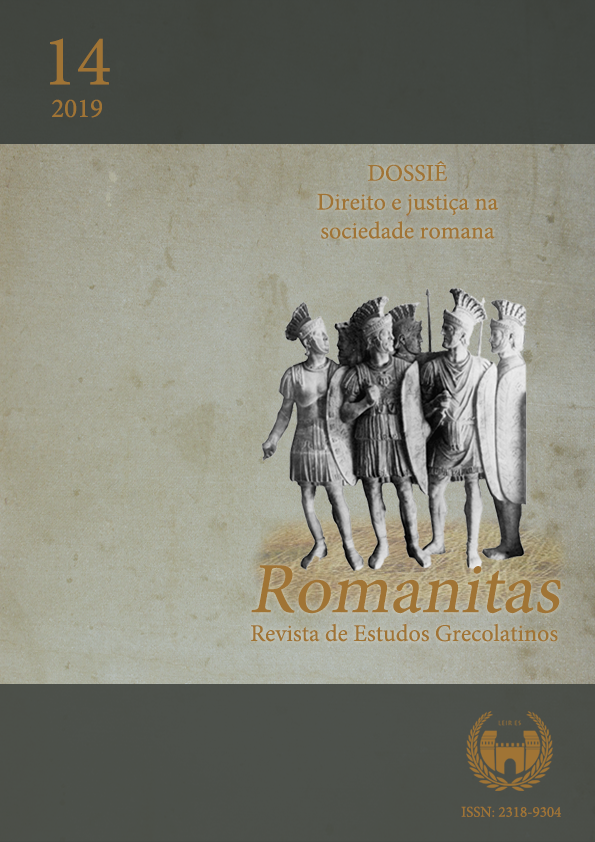Da morte ao renascimento social: Direito, escravidão e liberdade na Roma clássica
DOI :
https://doi.org/10.17648/rom.v0i14.28890Mots-clés :
Roma, Direito Romano, Escravidão, ManumissãoRésumé
Neste artigo, discute-se o problema da escravidão e da liberdade no Direito Romano. Pretendeu-se abordar o problema do reconhecimento da humanidade do escravo ao mesmo tempo que se estabeleceu a noção jurídica de res. Determinou-se como marcos temporais a consolidação do escravismo na Península Itálica até seu declínio – séculos III a.C. ao II d.C. A pesquisa do problema proposto realizou-se em fontes de Direito Romano: as Institutas, de Gaio, as Regras, de Ulpiano, bem como o Digesto, de Justiniano. Empreendeu-se levantamento historiográfico nas principais bases de referência acadêmica. A metodologia consistiu no confronto das opiniões jurídicas registradas nas fontes escolhidas e as interpretações historiográficas colhidas nas plataformas bibliográficas.
Téléchargements
Références
Documentação textual
ARISTÓTELES. A política. Rio de Janeiro: Nova Fronteira, 2011.
MARCUS TULLIUS CICERO. Stoic Paradoxes (Paradoxa Stoicorum). In: ______. Cicero’s three books of offices, or moral duties. New York: Harper & Brothers, 1892.
MARCUS TULLIUS CICERO. The tenth oration of M. T. Cicero against Marcus Antonius called also the tenth Philippic. In: ______. The orations of Marcus Tullius Cicero. A Public Domain Book, 1903. 4 v.
GAIUS. Institutiones or Institutes of Roman Law by Gaius. Oxford: Clarendon Press, 1904.
GAIUS. Institutionum iuris civilis comentarii quattuor. Traduction by James Muirhead. In: ______. The institutes of Gaius and rules of Ulpian: the former from studemund’s aprografh of the Verona Codex. Edinburgh: T. & T. Clarck, Law Booksellers, 1880.
ULPIANO. Fragmenta: sive excerta, Ulpiani libro singulari regularum. Traduction by James Muirhead. In: ______. The Institutes of Gaius and rules of Ulpiano: the former from Studemund’s Apograph of the Verona Codex. Edinburgh: T. & T. Clark, Law Bookselllers, 1880.
THE DIGEST OF JUSTINIAN. Traduction by Alan Watson. Philadelphia: University of Pennsylvania, 1998. 4 v.
Obras de apoio
ALLAIN, J. The legal understanding of slavery: from the historical to the contemporary. Oxford: Oxford University, 2018.
ALVES, J. C. M. Direito Romano. São Paulo: Forense, 2010.
BLACKBURN, R. The American crucible: slavery, emancipation and human rights. London: Verso, 2013.
BRADLEY, K. Slavery and society at Rome. Cambridge: Cambridge University, 1994.
BRETONE, M. História do Direito Romano. Lisboa: Estampa, 1998.
BUCKLAND, W. W. The Roman law of slavery: the condition of the slave in private law from Augustus to Justinia. New Jersey: The Lawbook Exchange, 2007.
BURDICK, W. L. The principles of Roman Law and their relation to Modern Law. New Jersey: The Lawbook Exchange Ltd., 2007.
DUCOS, M. Roma e o Direito. São Paulo: Madras, 2007.
DUMONT, J. C. Servus: Rome et l’esclavage sous la République. Paris: École Française de Rome, 1987.
FINLEY, M. I. Escravidão antiga e ideologia moderna. Rio de Janeiro: Graal, 1991.
GARDNER, J. F. Being a Roman citizen. Londres: Routledge, 1993.
HINDESS, B.; HIRST, P. Modos de produção pré-capitalistas. Rio de Janeiro: Zahar, 1976.
HADDAD, A. B. Vlastos e a escravidão em Platão. Revista Clássica, v. 28, n. 2. p. 93‑103, 2015.
JOLY, F. D. A escravidão na Roma Antiga. São Paulo: Alameda, 2013.
LOPES, J. R. O Direito na história: lições introdutórias. São Paulo: Max Limonad, 2002.
MARKY, T. Curso elementar de Direito Romano. São Paulo: Milesi, 1981.
MEILLASSOUX, C. Antropologia da escravidão: o ventre de ferro e dinheiro. Rio de Janeiro: Zahar, 1995.
MENDES, F. L. R. Escravidão e ordem política: uma comparação entre a ‘Política’ de Aristóteles e ‘A Utopia’ de Thomas More. Primeiros Estudos, n. 6, p. 65-75, 2014.
NICOSIA, E. Manumissio per epistulam. Revue Internationale des Droits de l’Antiquité, v. 47, p. 221-233, 2000.
PATTERSON, O. Slavery and social death: a comparative study. Cambrigde: Harvard University Press, 1982.
PELLOSO, C. Serviles personae in Roman Law. Journal of Global Slavery, v. 3, p. 92‑128, 2018.
SIRKS, A. J. B. The Lex Junia and the effects of informal manumission and iteration. Revue Internationale des Droits de l’Antiquité, v. 30, p. 211-292, 1983.
SMITH, W. Dictionary of Greek and Roman antiquities. London: John Murray, 1875.
VETTER, B. K. The historical development of some important methods of manumission in Roman Law. Revue internationale des Droits de l’Antiquité, v. 51, p. 355-368, 2004.
WATSON, A. Seventeenth-Century jurists, Roman Law, and the Law of Slavery. The Chicago‑Kent Review, v. 68, n. 3, p. 1343-1354, 1992.
WATSON, A. Slave Law in the Americas. Athens: University of Georgia, 1989.
WATSON, A. Thinking property at Rome. The Chicago‑Kent Review, v. 68, n. 3, p. 1355‑1371, 1993.
WOOD, E. M. Landlords and peasants, masters and slaves: class relations in Greek and Roman Antiquity. Historical Materialism, v. 10, n. 3, p. 17-69, 2000.
Téléchargements
Publiée
Numéro
Rubrique
Licence

Ce travail est disponible sous licence Creative Commons Attribution - Pas d'Utilisation Commerciale - Pas de Modification 4.0 International.
a. L’Auteur mantient les droits d’Auteur et accorde à la revue le droit de première publication.
b. L’Auteur a l’autorisation pour assumer des contrats additionnels séparément, pour distribution non exclusive de la version du travail publiée dans cette revue (ex.: publier en répertoire institutionnel ou comme chapitre de livre), avec reconnaissance de l’Auteur et publication initiale dans cette revue.
c. L’Auteur a l’autorisation et est encouragé à publier et distribuer leur travail en ligne (ex.: dans des répertoires institutionnels ou dans votre page personnelle) après la première publication par la revue, avec les créances.
d. Les textes de la revue sont publiés sous Licence CC BY 4.0 Deed Attribution 4.0 International (CC BY).

























